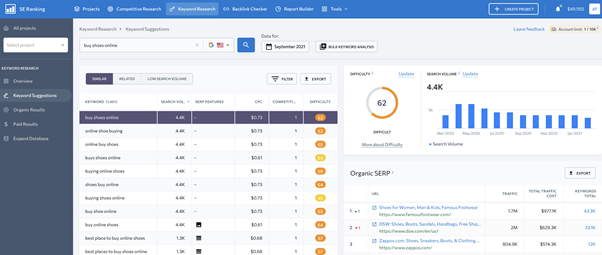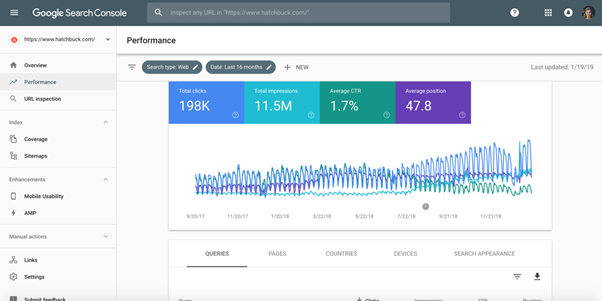
Keyword research is essential for business promotion when launching a new site or starting an SEO campaign for an existing site. Google search algorithms take into account over 200 factors. The algorithms consider the quality of content on pages, website usability, loading speed, and many other factors. As algorithms evolve, SEO strategies also change, but writing content using relevant SEO keywords will still be the primary step in increasing a website’s SERP visibility, ranking, and traffic.
Creating a strong keyword strategy is the first step in working on an SEO resource. But how should this be done not to affect the promotion and achieve a positive result in website ranking? This article will explain why it is important to use keywords, what they are, and which tools can be used for their research. We will also explain how to create a strong keyword promotion strategy despite constant improvements in search algorithms.
What is keyword research in SEO
Keyword research is the process of researching popular keywords on Google and other search engines to find the ones that are most relevant to your site and have the highest potential for traffic. Such keywords will be used further to optimize existing pages on the site or create new ones. This way, you can beat your competitors in SERPs.
The process of keyword research services should be ongoing. At the very beginning, brainstorm ideas, select phrases to launch the site, group them, and create pages on that basis. After that, you can regularly check the effectiveness of the promotion and add pages with other relevant queries. The goal is to make sure that search engines rank your resource higher and that potential customers of your business see your site among the top results in SERP for relevant requests.

What does “relevant” mean in this case? When researching keywords, focus on the words and phrases that your target audience would typically use to search for certain services, products, information, etc. These keywords will form the basis of your SEO promotion strategy.
Keywords help to rank at search engines
Relevant keywords help a site increase its position in SERPs. Simply put, the goal is to get your site to the top positions in SERPs for a certain user query. This will help increase traffic and improve sales of services or products, depending on the type of business.
How exactly does this happen? By adding keywords to the site, you inform the search engine what the pages of the resource are about. After that, search crawlers carefully analyze pages and these search queries using special algorithms. In addition to the presence of relevant phrases, search engines take hundreds of other factors into account. As a result, some pages of your resource appear either on the top positions in SERPs or at the very end of the list.
It’s important to understand that developing a promotion strategy is a long and ongoing process. Even with a strong content strategy, modern resource design, useful information, and, of course, relevant keywords, a new site has little chance to appear on the first pages of organic search results immediately. That is why SEO is continuous work that starts from the site’s very foundation and continues throughout its development.
Incidentally, this does not mean that a new business has no chance to be noticed by potential customers in search engines. We mentioned “organic search results” above. Getting to the top positions in SERPs results from proper SEO strategy when the search engine ranks your site higher than competitors’ sites for a particular search query.
Along with “organic results” for queries with words and phrases, Google shows “paid results” — sites that are promoted with the help of Google Ads. Typically, business owners combine SEO with paid advertising to increase the visibility of their sites.
Keyword research tells necessary information for website SEO
A keyword analysis is a basic task that any SEO starts with. Keyword research aims to understand what users are looking for and create content that meets their search intent. Collecting keywords is about finding, organizing, and analyzing user queries. Using the information obtained during the research, you can identify the target and potential keywords worth including in your site and take a higher position in SEPR.
Keyword research can set up an efficient SEO strategy because it is based on the power of data. You can prioritize your SEO efforts by choosing words with high search volume, low competition, or high conversion rates.
Select an automated approach in keyword research so that you don’t miss any optimization opportunity insight. There are many paid and free tools for relevant keyword selection, but you should use those with a large database of keywords for different countries and search engines. For example, with the help of the SE Ranking keyword generator tool, you can do complex keyword research, including finding keywords with the greatest potential, parameters analysis, and checking the competitor’s best ranking keywords.

With this service, you will be able to find out the following information:
- Keyword parameters: difficulty score, search volume, CPC, competition
- Similar, related, and low-volume search ideas
- Top organic and paid search results for a keyword
- SERP features
Google Search Console is another great free keyword research tool that helps businesses optimize their sites for searches, measure traffic, improve website performance in Google search results, and detect issues that need fixing.

With this resource, you’ll get essential information for SEO:
- What keyword phrases the resource is ranked for
- What positions in the rankings your site takes for these keywords
- How often do users click on links to your pages for certain queries
You can also try other keyword suggestion tools. Everything depends on your preferences, which will arise with time and experience.
Keywords help to outrank your competitors
Now you know that without keyword research, effective search engine promotion is impossible. But why is it so important, what aspects do keywords affect, and why do SEO experts spend so much time researching relevant keywords?
The research of keywords and relevant phrases gives us this necessary SEO information about competitors:
- Positions in the rankings your vs. competitors’ site take for certain keywords
- Phrases to use for easy promotion (mid- and low-frequency phrases)
- The level of keyword competition. Suppose it is high (high-frequency queries), so there is almost no chance to get to the top of search results
- Phrases your direct competitors use for promotion.
While planning an SEO strategy, equal time is spent on researching keywords used by your competitors and researching relevant keywords for your site. These two concepts are closely related because the main goal of promotion is to get ahead of competitors in search results and let the search engine know that you are better in every respect. For this purpose, tracking competitors’ keywords are carried out while planning an SEO campaign and throughout your website’s existence.
Keyword research defines a buyer persona
Another reason why keywords are so important is that they define a “buyer persona.” This is a collective image of your target audience that will help research relevant keywords and develop advertising campaigns to promote your business.
A buyer persona usually includes the following characteristics:
- Age
- Gender
- Interests
- Average income
The customer’s “pains” (problems). Your product or service should address these problems.

A buyer persona is not just one image. You can create several such images, depending on your area of expertise. Once you’ve created a buyer persona, keyword research will be much easier because you’ll be able to look at your business through the eyes of potential customers.
When you’ve researched keywords for each buyer persona and covered all the possible interests of your potential customers, these keywords can potentially bring targeted traffic to your site. This means that your site will attract those visitors who are mostly interested in your services.
Keywords drive traffic to the website
And so, you understand the importance of keywords for promotion. But how to add them harmoniously to the site to guarantee a steady traffic flow? Once you decide to attract traffic using keywords, be sure to cover the following areas of keyword SEO:
- Text content. Ideally, keywords should be used in all texts on the site, including informational articles, descriptions of individual categories, texts for products and services, meta tags, page headings.
- Internal anchors. These links in the text lead to other pages on your site if they match by topics. For example, you write about the drama genre on a page and mention the detective genre or an individual author. In these cases, you post links to pages with a detective novel and that author.
- External Anchors. Links that lead from other sites to yours. They are usually used to increase the relevance of your site to a group of queries.
- New pages. New pages should be initially planned for specific keyword groups.
Final Word
Search engines regularly update the algorithms by which they rank sites. This is done to improve the quality of content. Therefore, work in the field of SEO is becoming more challenging yet exciting. Because of the constant changes, many people ask the relevant question: “are keywords still important for SEO, or can we do without them?” The answer is a definite yes — keywords were, are, and will remain an integral part of SEO promotion. And when you learn how to research and use such words and phrases properly, 80% of success is yours.








